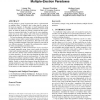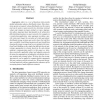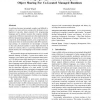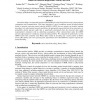311 search results - page 56 / 63 » An Empirical Model of Communication in Multiagent Systems |
163
Voted
SIGECOM
2011
ACM
14 years 4 months ago
2011
ACM
In many settings, a group of agents must come to a joint decision on multiple issues. In practice, this is often done by voting on the issues in sequence. In this paper, we model ...
123
Voted
DSN
2004
IEEE
15 years 5 months ago
2004
IEEE
Aggregation refers to a set of functions that provide global information about a distributed system. These functions operate on numeric values distributed over the system and can ...
123
click to vote
OOPSLA
2010
Springer
15 years 8 days ago
2010
Springer
As software becomes increasingly complex and difficult to analyze, it is more and more common for developers to use high-level, type-safe, object-oriented (OO) programming langua...
115
click to vote
JTAER
2010
15 years 8 days ago
2010
Digital ecosystems, or IT-ecosystems (ITEs), are composed of multiple and independent entities such as individuals, organizations, services, software, and applications. Together, ...
132
click to vote
JDCTA
2010
14 years 8 months ago
2010
Neural decoding is an important task for understanding how the biological nervous system performs computation and communication. This paper introduces a novel continuous neural de...




